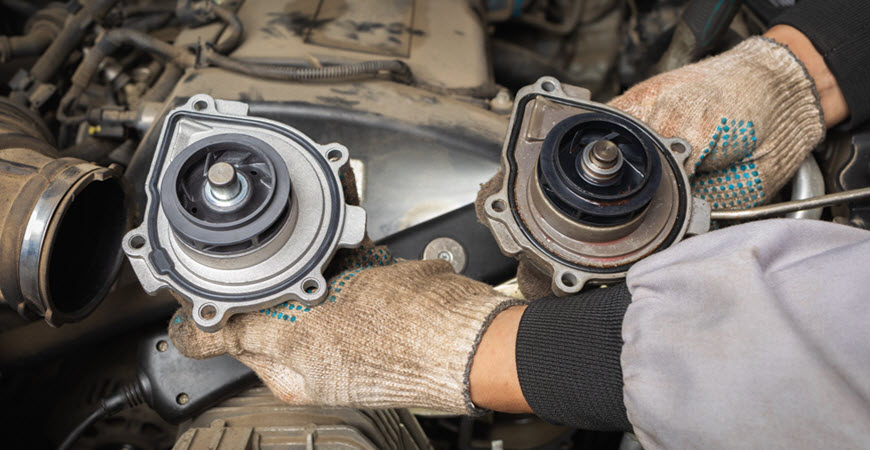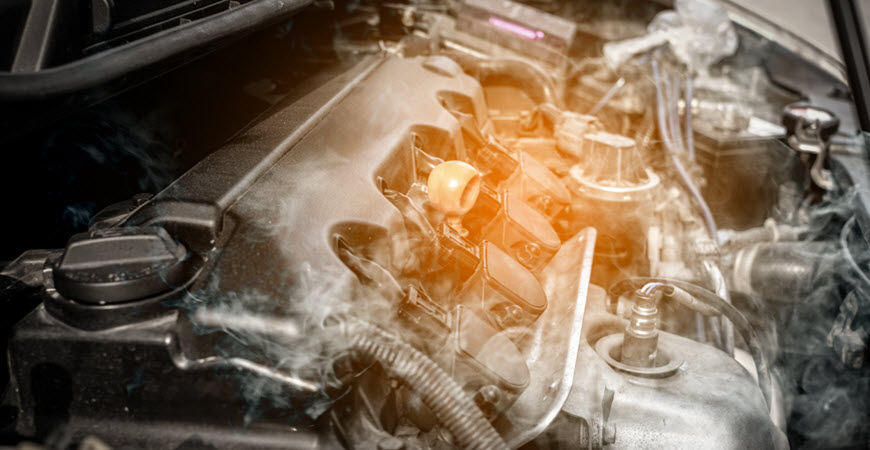One of the worst problems that Porsche owners have to deal with is engine overheating. If your temperature gauge is creeping into the red zone or you see steam pouring from beneath the hood, you need to act fast. Overheating leads to catastrophic engine damage that can cost you thousands of dollars to repair, not to mention a non-working engine.
At Escondido German Auto, we have worked on our share of Porsche overheating problems from drivers in Escondido, Rancho Bernardo, and Valley Center, CA. In this guide, we’ll outline the signs of overheating, the common causes, what to do in an emergency, and how to prevent this problem in the future.
Signs Your Porsche Is Overheating
Recognizing the symptoms of an engine running hot when they first appear can save you from significant engine damage that may otherwise develop. Here’s what to watch out for:
- High-Temperature Gauge: Your dashboard’s temperature gauge creeping into the red zone is the most obvious indicator.
- Steam from the hood: If you see steam, pull over immediately—this means that your engine is already too hot.
- Burning Odor: When coolant, oil, and plastic parts overheat, they burn and produce a powerful, unpleasant smell.
- Power Reduction: To avoid more damage, your Porsche may automatically limit engine performance.
- Low Coolant Light: If this light illuminates, you may need to add coolant, or your engine is already overheating.
If you see any of these signs, don’t dismiss them. The earlier you do, the less likely you will have to foot the bill for costly repairs.
Common Causes of Porsche Engine Overheating
There are a few possible reasons why your Porsche is overheating. Here are the most frequent offenders:
- Coolant Leaks: Coolant keeps your engine temperature in check, and your Porsche depends on it. When the radiator, hoses, water pump or heater core springs a leak, the level of coolant decreases, diminishing the cooling system’s potency.
- Faulty Thermostat: The thermostat regulates the flow of coolant according to the engine temperature. If it malfunctions, it can seize shut, blocking coolant from flowing through and causing the engine to boil over.
- Malfunctioning Water Pump: Coolant flows through the engine thanks to the water pump. A dead pump means bad circulation, which causes overheating in a hurry.
- Clogged or Damaged Radiator: Your radiator is where heat from the coolant is dissipated. Your engine relies on this to keep cool, so if it’s blocked with debris or if its cooling fans are malfunctioning, your engine will have a hard time staying cool.
- Low or Contaminated Coolant: Over time or due to contamination, coolant loses its thermal absorption capabilities. Never use the wrong (not specified per Porsche id) coolant.
- Blown Head Gasket: A blown head gasket mixes oil and coolant, inhibiting cooling and causing the engine to overheat. It’s an issue that cannot be taken lightly.
- Broken Cooling Fans: Your Porsche’s cooling fans are designed to help regulate temperature, particularly at low speeds or when you’re idling. When that fails, heat doesn’t disperse the way it should, and overheating occurs.
- Belt or Hose Failures: Damaged belts and hoses can cause leaks of coolant or prevent critical components from working correctly, which can keep your engine from staying cool.
How to Prevent Your Porsche’s Engine From Overheating
Regular maintenance is essential to prevent overheating problems with your Porsche. Replacing old coolant as scheduled in your owner’s manual is one of the most important steps. Coolant wears out over time, which can result in ineffective removal of heat. Also, check for leaks—if you see puddles of coolant under your car, there’s a leak in the radiator, hoses, or water pump that should be tended to ASAP.
Part of that essential practice is to monitor the thermostat. A failing thermostat blocks the coolant from circulating, leading to rapid overheating. When you observe temperature changes, it indicates that the thermostat is to be repaired or replaced. Also, the radiator or cooling fans play a key role in functioning properly. A clogged radiator or broken fan can choke up airflow, struggling to keep your engine cool in hot weather or gridlock.
It’s also wise to replace belts and hoses that show signs of wear before they fail. Worn, cracked or rotten belts may cause the water pump not to operate or damaged hoses can result in coolant loss. Finally, keeping up with regular servicing can prevent small issues from becoming major problems. Scheduled inspections also help confirm that your cooling system is doing its job to protect your engine from the perils of overheating.

Need Help? Visit Escondido German Auto
If not caught, the consequences can be dire, and you can find yourself stuck with a ruined engine, so don’t wait till it is too late if you notice your Porsche running hot. Our expert technicians at Escondido German Auto are trained to accurately diagnose and repair Porsche cooling system issues as soon as possible.
We are proud to service drivers in Escondido, Rancho Bernardo, and Valley Center, CA. We encourage you to schedule a professional inspection of your Porsche to be sure to stay on the road. Book an appointment today!

